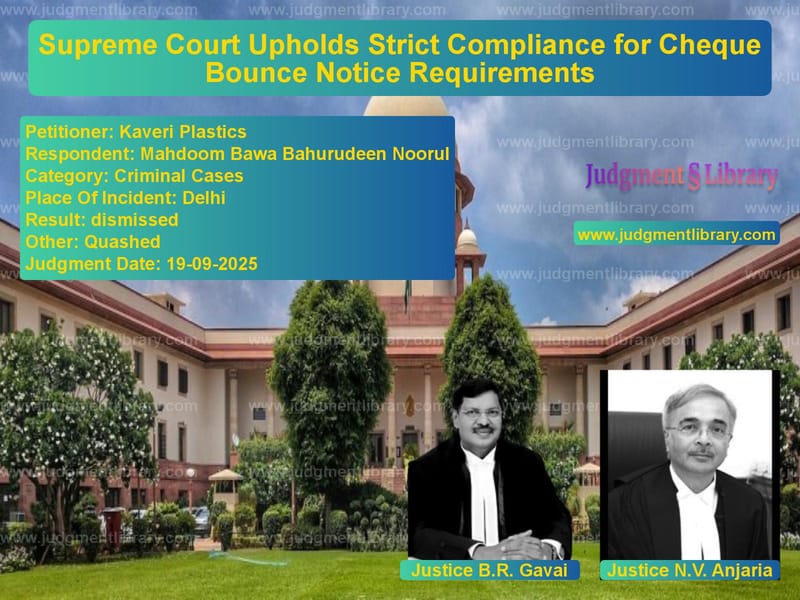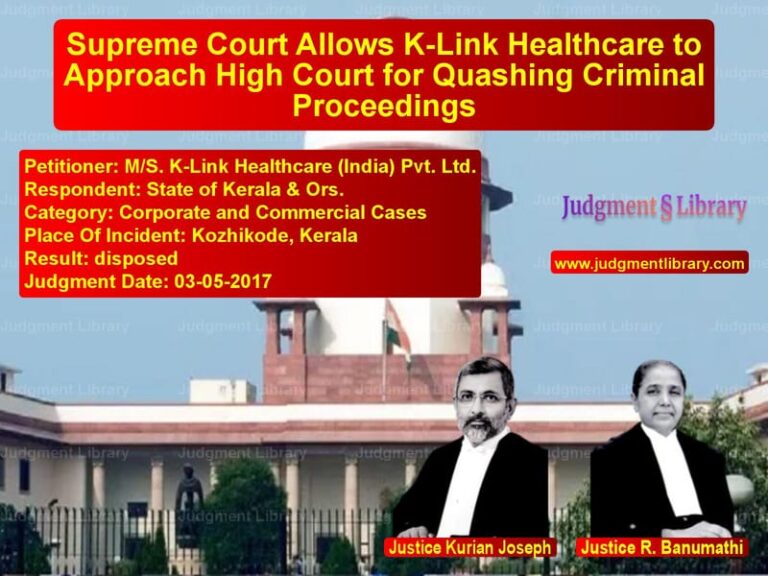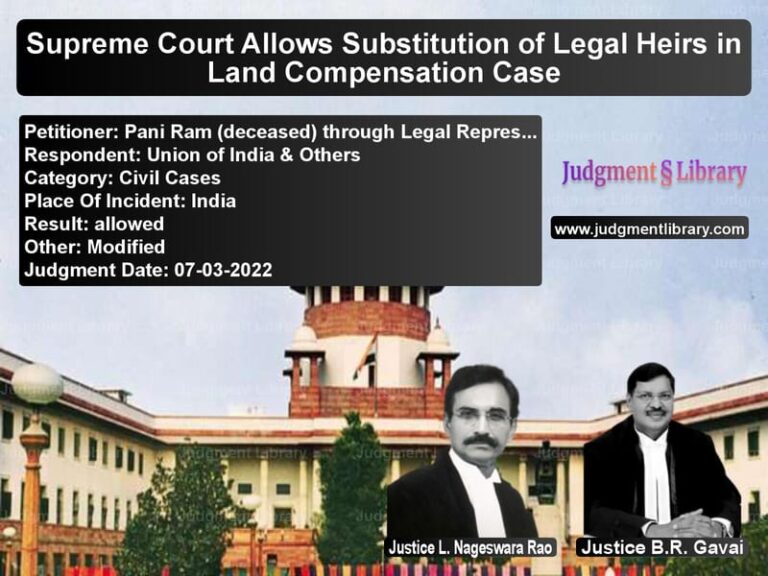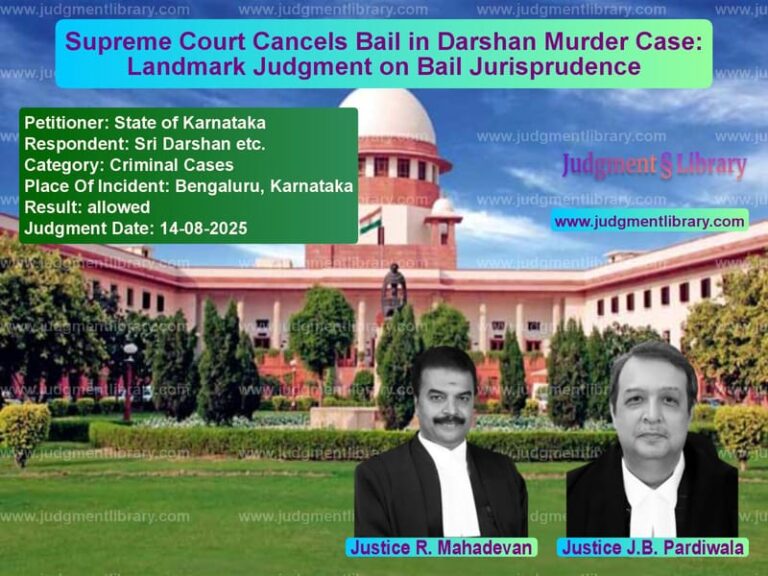Supreme Court Upholds Strict Compliance for Cheque Bounce Notice Requirements
In a significant ruling that reinforces the technical nature of cheque bounce cases, the Supreme Court of India has dismissed an appeal challenging the quashing of a criminal complaint under Section 138 of the Negotiable Instruments Act. The case centered around a crucial legal question: whether a demand notice that mentions an amount different from the actual cheque amount can be considered valid under the law, even if the discrepancy is claimed to be a typographical error.
The legal battle began when Kaveri Plastics filed a criminal complaint against Mahdoom Bawa Bahurudeen Noorul after a cheque for Rs. 1,00,00,000 was dishonored due to insufficient funds. However, the case took an unexpected turn when it was discovered that the legal notices sent by Kaveri Plastics demanded payment of Rs. 2,00,00,000 – double the actual cheque amount. This discrepancy became the focal point of the legal dispute that eventually reached the Supreme Court.
The Factual Background
The case originated from a Memorandum of Understanding dated April 30, 2012, between the appellant-complainant and accused No. 1-M/s. Nafto Gaz India Private Limited, relating to the sale of land. As part of this agreement, cheque number 876229 dated May 12, 2012, for Rs. 1,00,00,000 was issued in favor of Kaveri Plastics. When this cheque was presented for payment, it was returned dishonored with the remark ‘funds insufficient’.
Following the dishonor, Kaveri Plastics issued two demand notices – one on June 8, 2012, and another on September 14, 2012. Both notices contained the same crucial error: while they correctly described the cheque details, they demanded payment of Rs. 2,00,00,000 instead of the actual cheque amount of Rs. 1,00,00,000. The respondent accused filed an application seeking discharge, contending that the demand notice was not in terms of Proviso (b) to Section 138 of the NI Act.
The Legal Battle Through the Courts
The Metropolitan Magistrate initially dismissed the plea for discharge on October 6, 2021. However, the respondent approached the Delhi High Court, which delivered the impugned judgment on February 26, 2024. The High Court quashed the criminal complaint, holding that since the demand notice under Proviso (b) of Section 138 of the NI Act was at variance with the cheque amount, it was invalid and rendered the complaint liable to be quashed.
Before the Supreme Court, the appellant argued that the High Court had taken an overly technical approach. The appellant’s counsel, Mr. Sanjay Kumar, contended that “there was a clear typographical error on the part of the complainant in mentioning in the notice the different amount.” He emphasized that other details of the cheque were correctly mentioned in the notice and that the court should look at the substance of the matter rather than becoming technical.
The appellant further submitted that “the offence under Section 138 of the NI Act is essentially a civil wrong in the attire of criminal offence.” In that view, it was argued, technicalities should not be allowed to prevail. The appellant’s counsel warned that “the kind of view taken by the High Court, if allowed to be sustained, would give a premium to the drawer of the cheque whose cheque is dishonoured and has remained unpaid.”
The Respondent’s Counter-Arguments
On the other side, the respondent’s counsel, Mr. Siddharth Khattar, highlighted that Rs. 2,00,00,000 was demanded in both notices issued on June 8, 2012, and September 14, 2012. He argued that the issue was no longer res integra (a new issue) as various courts had consistently held that the demand in legal notice cannot be different from the cheque amount. The respondent’s counsel submitted that “the complainant took a false and a stock plea of typographical error in the notice.”
The Supreme Court’s Legal Analysis
Justice N.V. Anjaria, writing the judgment for the bench that included Chief Justice B.R. Gavai, delved deep into the legal provisions and precedents governing cheque bounce cases. The Court examined Section 138 of the Negotiable Instruments Act, which makes dishonor of cheques due to insufficient funds a punishable offence, subject to compliance with conditions specified in provisos (a), (b), and (c).
The Court focused particularly on the phrase ‘said amount of money’ occurring in Proviso (b) to Section 138. Quoting from its earlier decision in Suman Sethi vs. Ajay K. Churiwal & Anr., the Court reiterated: “We have to ascertain the meaning of the words the ‘said amount of money’ occurring in clauses (b) and (c) to the proviso to Section 138. Reading the section as a whole we have no hesitation to hold that the above expression refers to the words ‘payment of any amount of money’ occurring in the main Section 138 i.e. the cheque amount. So in a notice, under clause (b) to the proviso, demand has to be made for the cheque amount.”
The Court further elaborated: “In the notice, demand has to be made for the ‘said amount’ i.e. the cheque amount. If no such demand is made the notice no doubt would fall short of its legal requirement. Where in addition to the ‘said amount’ there is also a claim by way of interest, cost etc. whether the notice is bad would depend on the language of the notice. If in a notice while giving the break-up of the claim the cheque amount, interest, damages etc. are separately specified, other such claims for interest, cost etc. would be superfluous and these additional claims would be severable and will not invalidate the notice.”
The Principle of Strict Construction
A significant aspect of the judgment was the Court’s emphasis on the principle of strict construction of penal statutes. The Court quoted from M. Narayanan Nambiar vs. State of Kerala, which had referred to the English decision in Dyke vs. Elliot: “No doubt all penal Statutes are to be construed strictly, that is to say, the Court must see that the thing charged as an offence is within the plain meaning of the words used, and must not strain the words on any notion that there has been a slip, that there has been a casus omissus, that the thing is so clearly within the mischief that it must have been intended to be included if thought of.”
The Court further referenced Craies Statute Law, which cited U.S. v. Wiltberger: “The distinction between a strict construction and a more free one has, no doubt, in modern times almost disappeared, and the question now is, what is the true construction of the statute? I should say that in a criminal statute you must be quite sure that the offence charged is within the letter of the law. This rule is said to be founded on the tenderness of the law for the rights of individuals, and on the plain principle that the power of punishment is vested in the Legislature, and not in the judicial department, for it is the Legislature, not the Court, which is to define a crime and ordain its punishment.”
Typographical Error Defense Rejected
The Court specifically addressed the appellant’s argument about the typographical error, noting that this error occurred in both notices dated June 8, 2012, and September 14, 2012. The Court held: “The condition of notice under Proviso (b) is required to be complied with meticulously. Even typographical error can be no defence. The error even if typographical, would be fatal to the legality of notice, given the need for strict mandatory compliance.”
The Court explained that “when the provision is penal and the offence is technical, there is no escape from holding that the ‘said amount’ in proviso (b) cannot be the amount other than mentioned in the cheque in question for dishonour of which the notice is received, nor the mentioning of omnibus amount in the notice would fulfil the requirement.”
Legal Position Clarified
The Supreme Court summarized the legal position that emerges from various judicial pronouncements: “The notice demanding the payment of the amount covered by the dishonoured cheque is one of the main ingredients of the offence under Section 138 of the NI Act. In the event of the main ingredient not being satisfied on account of discrepancy in the amount of cheque and one mentioned in the notice, all proceedings under Section 138 of the NI Act would fall flat as bad in law.”
The Court emphasized that “the notice to be issued under Proviso (b) to Section 138 of the Act, must mention the same amount for which the cheque was issued. It is mandatory that the demand in the statutory notice has to be the very amount of the cheque.” The Court clarified that after mentioning the exact cheque amount, the sender may claim additional amounts such as legal charges, notice charges, and interest, provided the cheque amount is specifically demanded for payment.
Impact on Current Case and Future Litigation
Applying these legal principles to the facts of the case, the Court found that the cheque drawn by the respondent was for Rs. 1,00,00,000 whereas the notice demanded Rs. 2,00,00,000. The Court held that “the rigours of law on this score being strict, the defence would not hold good that the different amount mentioned in the notice was out of inadvertence. Even if the cheque number was mentioned in the notice, since the amount was different, it created an ambiguity and differentiation about the ‘said amount’. The notice stood invalid and bad in law.”
The Supreme Court’s judgment reinforces the technical nature of proceedings under Section 138 of the Negotiable Instruments Act. It serves as a crucial reminder to lawyers and litigants about the importance of precision in legal notices. The ruling establishes that even genuine errors, if they go to the root of the statutory requirement, cannot be overlooked in penal provisions.
This judgment is particularly significant for businesses and individuals who regularly deal with cheque transactions. It underscores the need for careful drafting of legal notices in cheque bounce cases and highlights that courts will insist on strict compliance with statutory requirements, regardless of the reasons behind any discrepancies. The decision maintains the balance between protecting the rights of complainants and ensuring that accused persons are not subjected to prosecution based on defective legal processes.
Petitioner Name: Kaveri Plastics.Respondent Name: Mahdoom Bawa Bahurudeen Noorul.Judgment By: Justice B.R. Gavai, Justice N.V. Anjaria.Place Of Incident: Delhi.Judgment Date: 19-09-2025.Result: dismissed.
Don’t miss out on the full details! Download the complete judgment in PDF format below and gain valuable insights instantly!
Download Judgment: kaveri-plastics-vs-mahdoom-bawa-bahurud-supreme-court-of-india-judgment-dated-19-09-2025.pdf
Directly Download Judgment: Directly download this Judgment
See all petitions in Fraud and Forgery
See all petitions in Cheque Dishonour Cases
See all petitions in Contract Disputes
See all petitions in Debt Recovery
See all petitions in Corporate Compliance
See all petitions in Judgment by B R Gavai
See all petitions in Judgment by N.V. Anjaria
See all petitions in dismissed
See all petitions in Quashed
See all petitions in supreme court of India judgments September 2025
See all petitions in 2025 judgments
See all posts in Criminal Cases Category
See all allowed petitions in Criminal Cases Category
See all Dismissed petitions in Criminal Cases Category
See all partially allowed petitions in Criminal Cases Category







